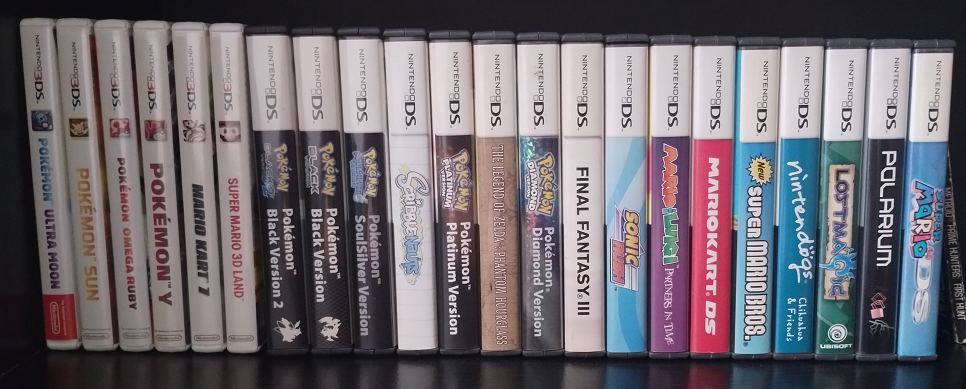
Here’s a pointless and, honestly, embarrassing fact about me: I sort my video games in reverse chronological order of when I originally got them. I’ve been doing it for over twenty years at this point, and I don’t know how to stop.
Continue readingAmong other things

Here’s a pointless and, honestly, embarrassing fact about me: I sort my video games in reverse chronological order of when I originally got them. I’ve been doing it for over twenty years at this point, and I don’t know how to stop.
Continue readingAs promised, the Advanced Search pages are now up and running!
Continue readingNot many new features this month (as I predicted at the end of my update post last month), but there’s a few fun things worth mentioning at least!
Continue readingThe Porydex development wildfire continues! This month was one of those rare times that saw an almost perfect balance between features that other people have actually asked for and will appreciate, versus niche features I added mainly for myself for fun. Let’s jump right into October’s hefty updates list.
Continue reading(Want to read Part 1 before you read this follow-up? Click here.)
This has been a great year for Porygon fans! Two new official plushes (including an absolutely ginormous mega-plush shipping early next year), an Ultra Pro TCG playmat releasing soon, and several new cards in the Scarlet & Violet TCG series—some of which were actually a challenge to find!
The Porygon family has only been featured in two sets so far in the Scarlet & Violet series: 151, where only the original Porygon was included, and Paradox Rift, which included the entire family along with an illustration rare of Porygon-Z.
But as cool as a full art Porygon-Z is, it’s not the card that collectors should be most excited about—because this year has seen the release of two new blister pack exclusive Porygon promo cards.
Continue readingThis post is another sequel in my vaguely defined productivity tracking series of blog posts. With any luck, this will also be the last.
Continue readingThis is a HUGE update—I did a lot of work on Porydex over the last three and a half weeks, and I’m extremely proud of how the project is coming along. Buckle up; Porydex has finally started reaching what I consider to be the next level.
Continue readingAs of a few minutes ago, porydex.com has finally been fully updated with the Pokémon Showdown usage stats data from the last few years!
The multi-year hiatus is finally over! Porydex is now up to date and shall remain up to date for at least the rest of the Scarlet/Violet generation.
And that’s pretty much the only outwardly exciting Porydex thing I accomplished.
But inwardly…
Continue readingOne of my proudest Pokémon video game achievements is breeding a shiny Smeargle (nicknamed Escher, because I’m that kind of dork) in Omega Ruby, and raising it to become a ribbon master: a Pokémon that has earned every ribbon available to it in the games it could be sent into.
It wasn’t always easy. The ORAS contest ribbons required me to do some pretty convoluted things to Sketch the optimal movesets for each contest condition. (But that was part of why I chose Smeargle for this journey in the first place—one of the most flexible Pokémon, for one of the most wide-ranging challenges.) And for the Battle Tree in Sun/Moon, at certain points I was dual-wielding my 3DS in one hand, and a laptop in the other, with reference pages open to Bulbapedia’s list of Battle Tree trainers and their movesets.
But I persevered, and eventually, Escher’s collection was complete, and its summary screen became a thing of beauty.
Now, many years later, after several games that didn’t include Smeargle (Sword/Shield, Legends: Arceus) and thus couldn’t contribute to my ribbon quest, it’s finally time to pick back up where I left off. Smeargle is available in both Brilliant Diamond/Shining Pearl and Scarlet/Violet, which means a slew of new ribbons for Escher to be adorned with.
Continue readingA tragic realization: In the very near future, most people who read my short story It’s Always Friday will probably think its female “President Harris” character is extremely uninspired and blandly named… Except for the fact that I named the character and wrote the story way back in 2018, long before real-world Kamala Harris was on everyone’s radar, or even mine.
I chose the name by reading lists of common American surnames and looking for one I thought the average person could think sounds presidential enough to vote for, lmao.
(This post is a childish self-defense in advance. And also, maybe a brag I guess?)
© 2025 Jesse Pirnat Writes
Theme by Anders Noren — Up ↑